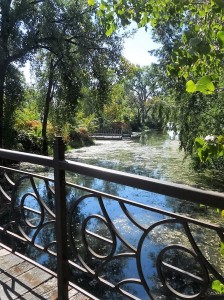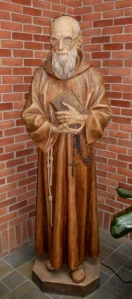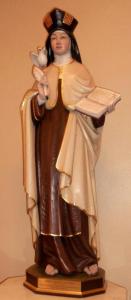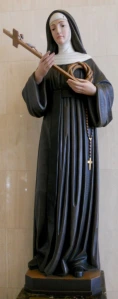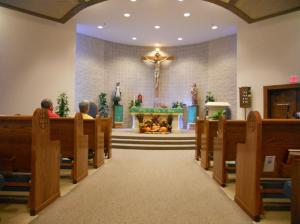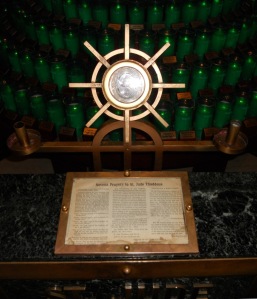Again, another finely-woven tapestry— heartfelt, hopeful, joyful— shared in a way that’s relatable, light-hearted, and memorable. The message is more than words, more than sentiments; it’s an invitation to love.
==========
Today’s homily, recorded, transcribed, and edited, was delivered by Fr. Joseph Craft at the St. Louis Cathedral in New Orleans.
My brothers and sisters, our readings today are spectacular. Have you ever had a day when you’ve looked up and said, “I’m burdened with the cares of this world and I just don’t know why, but I feel like the weight of the world is on top of me?” Or am I the only one who’s had a day like that? Well, then, we are just so blessed with our readings today.
Our first reading reminds us of Moses in Exodus. It’s this wonderful moment when God reveals himself and his name. What an incredible name: I am who am. How we say that in the Church is: “Yesterday, today, and forever, God is always the same.” That God who created. That God who will be from the very beginning to the very end. That God who is in love with you. And I hope this stops you cold in your tracks.
Let’s slow this down for a minute. Have you ever been in a situation where you grew up like I did with not too much money in the house? And, at some point, you said, “I sure wish I had a rich uncle that I don’t know about.” Maybe that family line you hear about in your heritage? Maybe you’re related to a king way back, and there’s still some money someplace? Well, guess what? That is the God of I am. And, in today’s gospel, he said, “Come to me, all you who are labored, and I will give you rest.”
We need to break this apart to fully understand. When he says “come to me,” did you notice where this rabbi is? He’s not waiting for you to figure things out while he waits in the temple. He’s actually out there looking for you and me in our streets. He’s come to our world and taken on our flesh, breaking down the barrier that was set up when our first parents, Adam and Eve, fell into original sin.
When he says “come to me,” what you need to hear is: “I have been looking for you your entire life. Come to me.” He calls out as a lover to his beloved, like a bridegroom seeking a bride. But it must be a free act of your will to say, “Yes. I will go to you, Lord.” He will never force us.
Someone shouts at him. “What’s the kingdom of heaven like?” And he says, “The kingdom of heaven is like a bridegroom long delayed.” That’s Christ. And he’s looking for his bride. That’s what we hear.
“Come to me, all you who labor and are burdened.”
Maybe that was in reference to the six-hundred-thirteen commandments the Jewish people contended with in the time of Moses? Maybe it’s trying to keep all the commandments of the church today? Maybe it’s just living in a world today where we have to pay bills to be able to eat?
He says, “I know your plight. Come to me, you who are laboring and burdened.” Then he says, “What I have, the love I have for you, will give you rest.” In fact, the love that makes you go out and keep working so you can eat those nice meals and go to those nice places is really a God-sized hole in your heart. You’re trying to find God. And he’s gonna tell you, “That’s free.
“Take my yoke upon you.”
He wants to have two laws: To love God, to love others as yourself.
He says, “My yoke is easy.” It’s about love. And then he tells you that he’s meek and humble of heart. He’s not coming like the god that wants us to bang out the rules one by one. He’s meek and humble of heart— humble— meaning he’s doing the Father’s will.
I’ll ask the same question from yesterday. What’s heaven like? Does anybody know what heaven’s going to be like?
Heaven is where everyone’s doing the will of the Father. And he’s showing you that he does that himself by coming to us, searching for us, and loving us. His yoke is easy; his burden, light.
My brothers and sisters, what you receive today in this beautiful gospel is God’s love letter to you. He says he loves you. He seeks you like a bridegroom seeking a bride and— after searching for you your whole life right up to this moment— he’s asking, “Now, come to me.”
So, come to him— in his word, in the Eucharist— and let him love you. His love will shape your life.
Quote
Jesus is waiting, so go and find him when your strength and patience are giving out, when you feel lonely and helpless. Say to him: “You know well what is happening, my dear Jesus. I have only you. Come to my aid….” And then go your way. And don’t worry about knowing how you are going to manage. It is enough to have told our good Lord. He has an excellent memory (St. Jeanne Jugan).
Links of interest… Archdiocese of New Orleans… Be still & know that I am God… Commandments: greatest / how to follow the first two (more) / most important / ten… I am who I am… Jesus: divinity of Christ / seven I AM statements / who do you say that I am… Moses: facts / who was… St. Louis Cathedral: daily saints / history / Mass / photos / tours / website… You can only know the answer to “who am I” by discovering who God is…
WP posts… Beatitudes… Blessed blessing… Collective heart… Corpus Christi… Foundation… Freedom… Graces shared… Heaven… Mary’s gifts… Most Holy Trinity… Perfect prayer… Salt and light… St. Joseph… Sunset… Truth
Filed under: Commandments, homilies, spiritual gifts | Tagged: building community, God's master plan, overcoming adversity, St. Louis Cathedral-New Orleans LA | Leave a comment »







